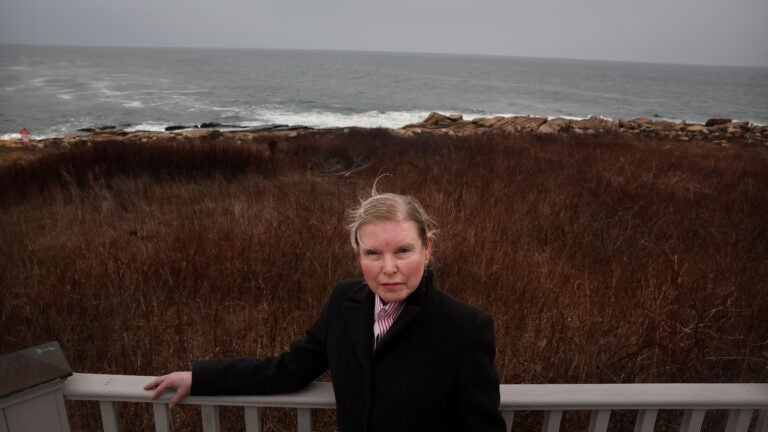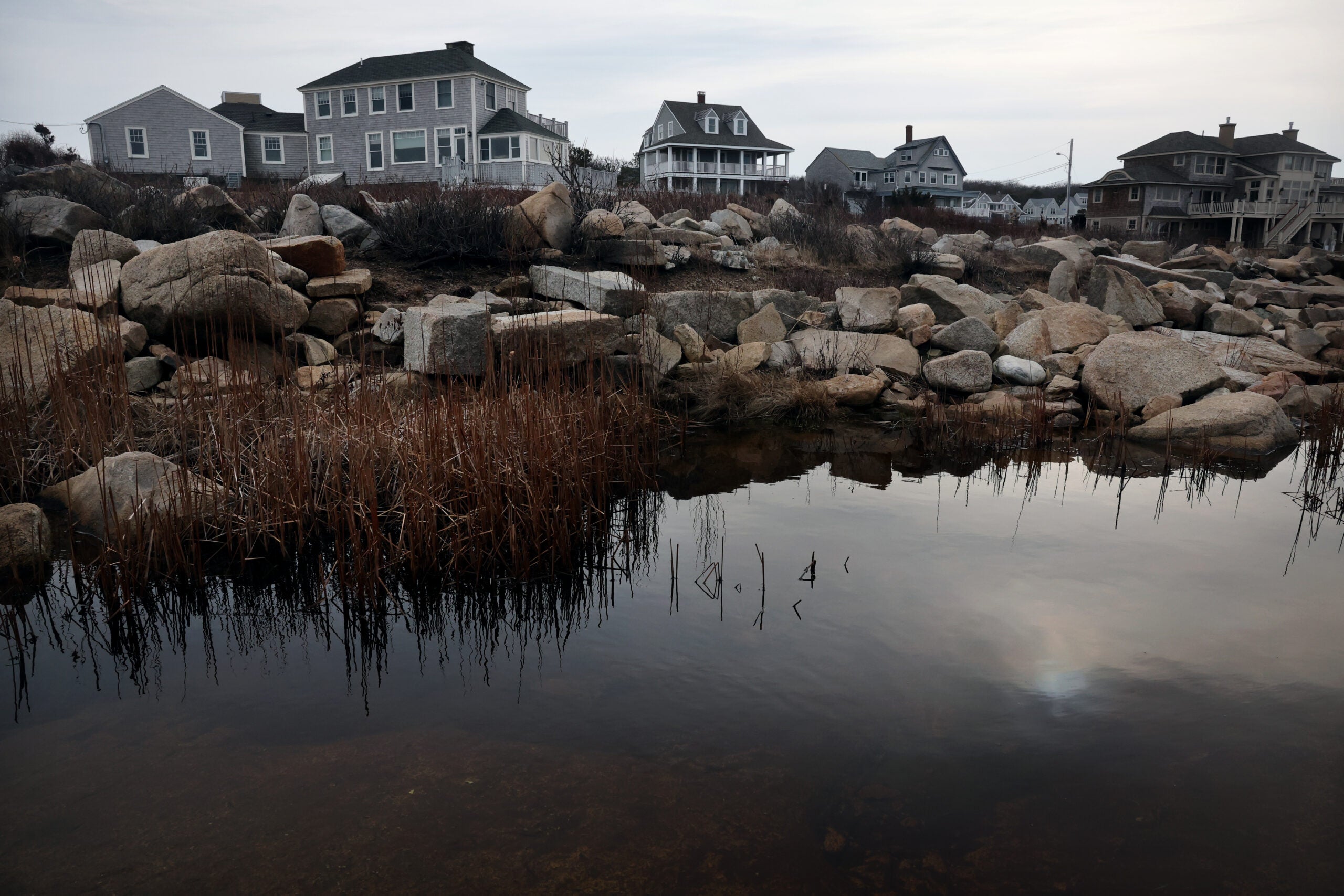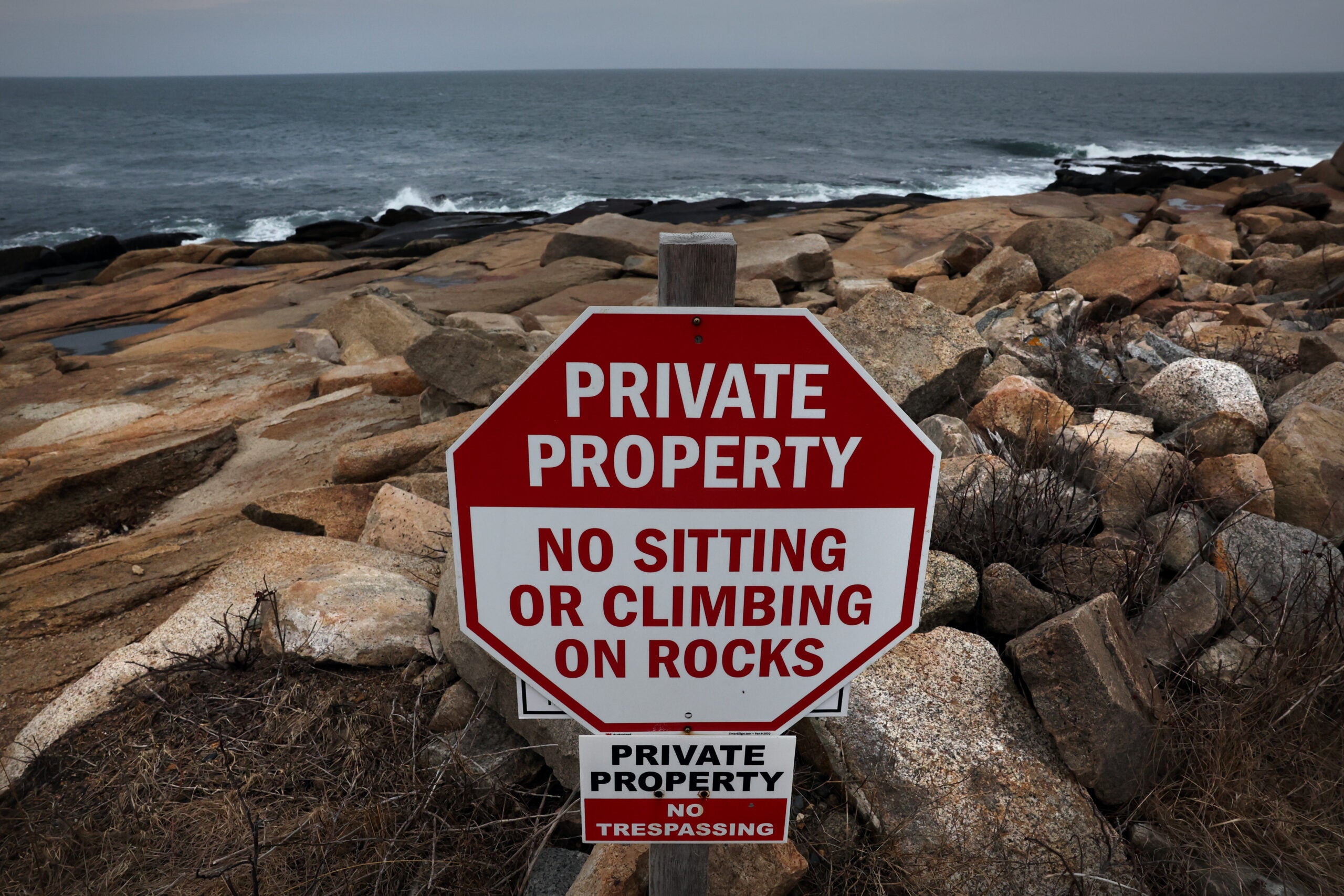Andrew’s Point in Rockport has long been open to the public. Now, an oceanfront homeowner is suing to end that.

ROCKPORT — “There it is,” John Penaloza said as he reached the end of a public foot path leading to a majestic stretch of coast known as Andrew’s Point. But he was not referring to the giant boulders or the rocky ledges, the crashing waves or the circling sea birds. No, he was pointing at a sign posted by the property owner that read: “Private Property. No sitting or climbing on rocks. No trespassing.”
“Anyone can buy a sign,” Penaloza, a local activist, said as he proudly ignored the warnings and continued onto the rocks.
For as long as anyone can remember, Andrew’s Point has been one of the jewels of the Atlantic Path, a 2-mile stretch of rocky shoreline at the tip of Cape Ann that has been a mecca for birders and fishermen, hikers and picnickers. Because unlike much of the coast around it, the Atlantic Path has long been open to the public, thanks to a combination of deeded easements and established rights of way.
But now that public access is under legal threat, in what coastal access advocates up and down Massachusetts say is an all-too-familiar story: a wealthy oceanfront homeowner brings a costly lawsuit in an attempt to pressure a cash-strapped local government into a compromise, one that typically means reduced public access.
At Andrew’s Point, a homeowner named Elizabeth Fisher, who owns an acre of oceanfront property on Longbranch Avenue, has erected the “no trespassing” signs and filed two lawsuits seeking to block public access to the coastline. One suit is against the town, challenging the legality of the two public foot paths on either side of her property, and the other is against the state, seeking to void a provision in her deed, dating to 1887, that the coastal rocks and ledges on her property must remain open to the general public.

Fisher, an attorney herself, has paused the suit against the town while she battles the attorney general’s office over the portion of her property that is on the Atlantic Path. It is a suit she first filed in 1995, four years after she and her then-husband bought the property for $543,000. It lay dormant for decades with no resolution, but Fisher’s attorney said she felt the need to restart it after the property saw increased use during the pandemic.
On a Saturday earlier this month, more than 100 people attended a public meeting held by Assistant Attorney General Kendra Kinscherf, who was seeking their help in establishing that the rocks at Andrew’s Point have been in continual public use since 1887. She was looking particularly for any evidence of use before 1950, as requested by a judge in the case, to establish that the public met the requirement of accepting the gift in the deed in a reasonable amount of time.
Fisher has declined to comment publicly on the case, but her attorney, Jason Curtin, is floating the idea of a compromise, offering to let people walk across the rocks as long as they do not linger.
“She has a problem with people encamping themselves,” Curtin said in an interview, “setting up beach chairs, playing music, jumping off dangerous ledges, dogs running in her backyard when she’s trying to enjoy her property. Bird watchers that are coming with powerful lenses make her feel uncomfortable in her second-floor bathroom. She is made to feel a stranger in her own home.”

But many residents bristle at the thought of a compromise, including Paul Bryant, who said his family has picnicked at Andrew’s Point for more than 50 years, every Wednesday night of the summer.
“When she bought that property, she knew the public has had access since the 1800s, and there’s no reason we should give that up now. The idea that we would just allow walking is unacceptable and should not be on the table,” Bryant said. “But I’m also concerned that the system we have to defend against these threats is failing. Towns want to spend as little money as possible to defend these things, and they cut corners.”
Rockport has a long history of protecting and preserving public access to the coast, through dozens of clearly marked public foot paths maintained by a Rights of Way Committee. But that committee, as well as the town government, came under criticism last summer after the Board of Selectmen made a compromise with a homeowner on another section of the Atlantic Path.
That particular stretch is tricky to navigate on the rocks, with icy stretches in winter thanks to freshwater runoff, so the path followed rights of way leading through vegetation on the edge of several yards. One homeowner even built a “rest area” for people walking the path: an array of shaded boulders to sit on during the heat of summer.
But a homeowner on Phillips Avenue claimed the path was eroding a wall they built just inches from the path, and after several contentious years, the town reached a deal last summer to move the path down onto the very rocks the original path had sought to avoid.
Penaloza led protests against the compromise and joined groups that continued to use the original path, insisting that a right of way belonged to the public, not town government. When he took a reporter there on a recent day, however, he was shocked to see that some newly planted vegetation had made the original path impassible.
“This is landscape terrorism,” he declared.
Nathan Ives, the chair of the Rights of Way Committee, declined to comment on the past or current litigation over the path. When asked about the concern that the towns are ill-equipped for legal battles with deep-pocketed residents, he said, “there’s always concern from the public about that and you strive to do the best you can with the circumstances you’re faced with.”
Chris Borgatti, the chair of the Massachusetts chapter of the Surfrider Foundation, a volunteer environmental group that works to maintain and expand public access to the ocean, said the fight against private property owners never ends.
“The people who own coastal real estate have the financial resources and political leverage in a lot of cases that exceeds the capacity of the public,” Borgatti said. “And they threaten access to the ocean in a variety of ways, whether it be putting up fences or planting vegetation, or limiting things like parking.”
At the public meeting, John Nelson, the chair of the Association of Massachusetts Bird Clubs, lamented that access to Andrew’s Point was already limited by the disappearance of public parking two years ago.
First, birders reported finding a car parked sideways, blocking the spots where they had long parked. “That was the first sign of trouble,” Nelson said in an interview. “Shortly after that the town put up ‘no parking’ signs.”
Marci Wickham, who has a family summer cottage two doors down from Fisher, in a house her grandparents purchased in 1950, said Fisher is to blame for the no parking signs and a host of other efforts to keep the public away from Andrew’s Point.
“She [tells people] they can’t be there. Scares away all the tourists,” Wickham said. “She knew full well what the public rights were when she signed on the dotted line, and now she’s bringing terror to Andrew’s Point, and by proxy the entire town of Rockport. And I’m worried it’s going to snowball. If she wins, or if the town cuts a deal, what happens the next time?”
Randy Saville, the ninth generation of his family to live in Rockport, said any compromise on public access is a permanent mistake.
“This is a town where new money comes in, stays for one or two generations, wins their case, and then forever the public is locked out of whatever they won,” he said. “It’s a short-term benefit for a long-term public detriment.”
“Andrew’s Point is a special place. It’s got these big flat rocks that invite you to sit and soak it in. It’s not a place you visit for 90 seconds. It’s a place you picnic. A place you watch the sunset. I can’t imagine getting upset that someone walks by your house because you live in a nice place.”








Conversation
This discussion has ended. Please join elsewhere on Boston.com